10 start with P start with P

It traces the routes of human migration throughout Eurasia, shows Siberian lithic industries as they evolved from the Early through the Middle and Late Paleolithic, and correlates them with reports from Mongolia, China, Japan, and America.

E-Textbooks are now available to purchase or rent through VitalSource.com! Please visit VitalSource for more information on pricing and availability.
As of January 1, 2021, Smart Sparrow Companion Websites are no longer available for any of our textbook programs. New companion websites are coming soon, and will be hosted by Lingco. Instructors may sample the new companion websites now by visiting GUPTextbooks.com/companionwebsites. The full websites will be available for fall 2021 course adoption.
Until the new companion websites become available, eBook Workbooks with exercises from the Smart Sparrow Electronic Workbook are available for purchase on the GUP website and VitalSource.com, as are Workbook Answer Keys. They will both be sold in eBook format only.
Panorama moves intermediate-level students of Russian toward advanced proficiency by engaging them in a systematic and comprehensive approach to Russian grammar with texts from a variety of genres, including proverbs and sayings to immerse students in Russian culture.
By reading and listening to Russian literary classics and contemporary nonfiction texts, students develop a contextual understanding of Russian culture and forms of expression that grow their command of vocabulary, grammar, and complex syntax. The textbook includes comprehensive in-class vocabulary and grammar exercises and discussion topics as well as reading texts (for work in class and at home), summative oral and written exercises, and compelling color photos.
An additional eBook Workbook (sold separately) includes essential homework exercises to practice vocabulary, grammar, listening, and speaking. eBook Workbook Answer Keys are also available for purchase for instructor use, or for students to check their own work.
Features of Panorama:
• Content can be used in one semester/two terms or for a full year• Modular structure allows instructors flexibility to assign chapters in their own sequence• Authentic photojournalist photos to prompt discussion exercises for each chapter topic• Summative exercises for each chapter test student mastery of the grammar topics, vocabulary, and cultural competence related to the chapter theme in a written essay format• Most grammar examples and exercises are drawn from the Russian National Corpus• Readings include blogs, blog comments, articles, and interviews, exposing students to current Russian culture and language. • Audio needed for completing homework exercises is available for free at www.press.georgetown.edu
For Teachers:
Exam copies of the textbook, Workbook, and Workbook Answer Keys are available free of charge to instructors and must be requested separately. Textbook exam copies can be ordered on this page. To request digital exam copies of the Workbook and Workbook Answer Keys, please visit the pages for each of those products, or visit VitalSource.com.
A free online Teachers Manual is also available and features supplementary activities and texts, including ideas for group activities, research projects, songs and video clips for each chapter, audio files of native speakers reading the literary classics from each chapter, and guidance to create a syllabus and exam, with a sample syllabus and sample chapter test. Available at www.press.georgetown.edu.

The so-called “New Russian Drama” emerged at the end of the twentieth century, following a long period of decline in dramatic writing in the late Soviet and post-Soviet era. In Performing Violence, Birgit Beumers and Mark Lipovetsky examine the representation of violence in these new dramatic works by young Russian playwrights. Reflecting the disappointment in Yeltsin’s democratic reforms and Putin’s neoconservative politics, the plays focus on political and social representations of violence, its performances, and its justifications.
As the first English-language study of Russian drama and theatre in the twenty-first century, Performing Violence seeks a vantage point for the analysis of brutality in post-Soviet culture. While previous generations had preferred poetry and prose, this new breed of authors—the Presnyakov brothers, Evgeni Grishkovets, and Vasili Sigarev among them—have garnered international recognition for their fierce plays. This book investigates the violent portrayal of the identity crisis of a generation as represented in their theatrical works, and will be a key text for students and scholars of drama, Russian studies, and literature.

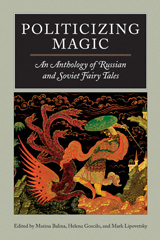
We were born to make fairy tales come true. As one of Stalinism's more memorable slogans, this one suggests that the fairy tale figured in Soviet culture as far more than a category of children's literature. How much more-and how cannily Russian fairy tales reflect and interpret Soviet culture, especially in its utopian ambitions-becomes clear for the first time in Politicizing Magic, a compendium of folkloric, literary, and critical texts that demonstrate the degree to which ancient fairy-tale fantasies acquired political and historical meanings during the catastrophic twentieth century.
Introducing Western readers to the most representative texts of Russian folkloric and literary tales, this book documents a rich exploration of this colorful genre through all periods of Soviet literary production (1920-1985) by authors with varied political and aesthetic allegiances. Here are traditional Russian folkloric tales and transformations of these tales that, adopting the didacticism of Soviet ideology, proved significant for the official discourse of Socialist Realism. Here, too, are narratives produced during the same era that use the fairy-tale paradigm as a deconstructive device aimed at the very underpinnings of the Soviet system. The editors' introductory essays acquaint readers with the fairy-tale paradigm and the permutations it underwent within the utopian dream of Soviet culture, deftly placing each-from traditional folklore to fairy tales of Socialist Realism, to real-life events recast as fairy tales for ironic effect-in its literary, historical, and political context.
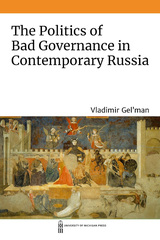
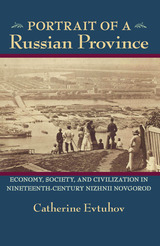
Several stark premises have long prevailed in our approach to Russian history. It was commonly assumed that Russia had always labored under a highly centralized and autocratic imperial state. The responsibility for this lamentable state of affairs was ultimately assigned to the profoundly agrarian character of Russian society. The countryside, home to the overwhelming majority of the nation’s population, was considered a harsh world of cruel landowners and ignorant peasants, and a strong hand was required for such a crude society.
A number of significant conclusions flowed from this understanding. Deep and abiding social divisions obstructed the evolution of modernity, as experienced “naturally” in other parts of Europe, so there was no Renaissance or Reformation; merely a derivative Enlightenment; and only a distorted capitalism. And since only despotism could contain these volatile social forces, it followed that the 1917 Revolution was an inevitable explosion resulting from these intolerable contradictions—and so too were the blood-soaked realities of the Soviet regime that came after. In short, the sheer immensity of its provincial backwardness could explain almost everything negative about the course of Russian history.
This book undermines these preconceptions. Through her close study of the province of Nizhnii Novgorod in the nineteenth century, Catherine Evtuhov demonstrates how nearly everything we thought we knew about the dynamics of Russian
society was wrong. Instead of peasants ground down by poverty and ignorance, we find skilled farmers, talented artisans and craftsmen, and enterprising tradespeople. Instead of an exclusively centrally administered state, we discover effective and participatory local government. Instead of pervasive ignorance, we are shown a lively cultural scene and an active middle class. Instead of a defining Russian exceptionalism, we find a world recognizable to any historian of nineteenth-century Europe.
Drawing on a wide range of Russian social, environmental, economic, cultural, and intellectual history, and synthesizing it with deep archival research of the Nizhnii Novgorod province, Evtuhov overturns a simplistic view of the Russian past. Rooted in, but going well beyond, provincial affairs, her book challenges us with an entirely new perspective on Russia’s historical trajectory.
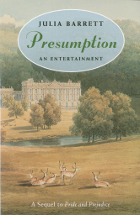
"An elegant emulation and continuation of Pride and Prejudice. . . . Jointly composed by two admirers of Jane Austen, the book often achieves crisp replication of her style. . . . Presumption shows how sequel-writing can, like parody, be a sharp exercise in literary appreciation."—Peter Kemp, Times Literary Supplement
Julia Barrett is a pseudonym for Julia Braun Kessler and Gabrielle Donnelly.

An advanced, student-centered textbook that uses popular media to explore diverse perspectives from across Russian-speaking cultures
Pro-dvizhenie is a student-centered, inquiry-based textbook designed to build Advanced-level Russian proficiency through engagement with timely topics that encourage reflection and examination. Whether exploring the role of technology in relationships, learning about indigenous communities of Russia, or reflecting on what it means to live well, Pro-dvizhenie uses popular Russian film, TV, and media as a springboard for various types of activities, including skill-building exercises, essay writing, and group projects. Students are encouraged to challenge assumptions and make intercultural connections throughout while developing ACTFL Advanced-level skills such as argumentation, narration, and collaboration.
Students benefit from extensive activities and resources, including audio and video of diverse voices and viewpoints from across Russia, available to stream on the Press website. A full-service textbook for instructors, Pro-dvizhenie includes extensive online instructors’ resources, such as additional grammar and vocabulary assignments, writing and group project prompts, grading rubrics, and answer keys. A modular structure and activities at various levels of difficulty give instructors the flexibility to select material in the book based on their class’s needs, making Pro-dvizhenie perfectly suited for mixed-level classrooms. The textbook can be used over one semester or over the course of a full year.
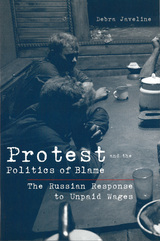
Previous studies have tried to explain the Russian response to economic hardship by focusing on the economic, organizational, psychological, cultural, and other obstacles that prevent Russians from acting collectively. Challenging the conventional wisdom by testing these alternative explanations with data from an original nationwide survey, Javeline finds that many of the alternative explanations come up short. Instead, she focuses on the need to specify blame among the dizzying number of culprits and potential problem solvers in the crisis, including Russia's central authorities, local authorities, and enterprise managers. Javeline shows that understanding causal relationships drives human behavior and that specificity in blame attribution for a problem influences whether people address that problem through protest.
Debra Javeline is Assistant Professor of Political Science, Rice University.
READERS
Browse our collection.
PUBLISHERS
See BiblioVault's publisher services.
STUDENT SERVICES
Files for college accessibility offices.
UChicago Accessibility Resources
home | accessibility | search | about | contact us
BiblioVault ® 2001 - 2024
The University of Chicago Press









